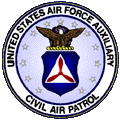
The mission of the Civil Air Patrol is to provide the youth of our nation a quality program that enhances their leadership skills through an interest in aviation, and simultaneously provide services to the United States Air Force and their local community. Commanders are responsible for conducting the cadet program in accordance with this regulation. Common sense and good judgment will be exercised in appointing qualified senior members to work with cadets. The cadet program permits every cadet to:
Through study and performance, cadets work through a series of achievements. As cadets progress, they may receive ribbons, certificates, and eligibility for nationally sponsored special activities, or eligibility to apply and compete for academic and flight scholarships. An increase in grade recognition that is capable of accepting increased responsibility. PROGRAM ELEMENTSAlthough program elements may vary from squadron to squadron, the following elements most likely will be incorporated into the cadet program:
Regular and active participation in local unit is required. MEMBERSHIPPotential cadets may apply to join the cadet program at any time by making a formal application for membership using the CAPF 15 (CAP Forms On-Line), or Application for Cadet membership in Civil Air Patrol. The initial membership fee includes the cost of texts and study materials require for the initial part of the cadet program. Once the Unit Membership Board reviews the application, if it is approved, and the squadron concurs by signing the application, the new cadet sends the application and fee to: 105 South Hansell Street, Building 714 Maxwell Air Force Base Alabama 36112-6332. Cadets are officially members of CAP when HQ CAP/DP has processed their application and their name appears on the national cadet database. The CAP Bookstore will send the new member the Phase I and Phase II study material packet and CAPF 59-1, Phase I and II Certification. This form will be placed in the cadet's personnel record until phase completion. PROGRESSIONEach achievement in the cadet program will be completed in sequence. Cadets can complete the first achievement anytime after joining. All other achievements require a minimum 60-day separation between competition of each of the achievements.
National Cadet Special Activities (NCSA) are designed to provide cadets with incentives and motivation toward greater participation in the cadet program and contribute directly to knowledge of career opportunities both in the military and civilian fields. Qualifications and requirements for all national cadet activities are published and distributed annually by national headquarters in the Civil Air Patrol News and on the website at www.capnhq.gov. ORIENTATION FLIGHTSThe Cadet Flight Orientation Program is designed to expose cadets to general aviation through a series of flights. These flights may be in powered or glider aircraft. Cadets 17 years of age or younger are encouraged to participate in the flight orientated program (cadets 18-20 years old may participate in military orientation flights). Flights demonstrate basic flight maneuvers, navigational, and communications techniques as well as pre-flight planning and post-flight debriefings. FLIGHT SCHOLARSHIPSTraining in airplanes and gliders may be accomplished at a centralized event (like the National Flight Academy) or on an individual basis. Refer to the Civil Air Patrol News for details about any national flight scholarships that are available or check the national website at www.caphq.gov. USAFA PREPARATORY SCHOOLEach year, National Headquarters submits nominations to the Air Force Academy for three qualified cadet members to attend the Academy's Preparatory School (USAFAPS). This one-year program increases a student's potential for admission to the Academy and for successful completion of the Academy's curriculum. COLOR GUARDS AND HONOR GUARDSTo enhance CAP's public image, squadrons may form a color guard and/or honor guard. Check with the individual squadron to see if one exists or of one could be formed. NATIONAL COMPETITIONThe National Cadet Competition (NCC) enables cadets to model traits of the highest standards of leadership and personal responsibility. The NCC includes the National Drill Team Competition and the National Color Guard Competition. REGIONAL CADET LEADERSHIP SCHOOLSThe Regional Cadet Leadership Schools (RCLS) provide courses to increase knowledge, skills, and attitudes as they pertain to leadership and management. INTERNATIONAL AIR CADET EXCHANGE PROGRAM (IACE)Cadets and senior members may apply for the International Air Cadet Exchange and serve as "Ambassadors" to various countries that promote international understanding, goodwill, and friendship among young people who have a common interest in aviation. You may explore these countries through gliding, mountain climbing, tours, orientation flights, museums, various sport activities, and meet cadets from abroad and their families. While being honored at various receptions, you may also meet famous celebrities or military/political dignitaries. IACE is available to cadets who have reached a certain level of training and are at least 17 years old by July 1 of the year they are attending IACE. Check the national website www.caphq.gov, CAP News or with your squadron commander to find out the specific requirements.
|